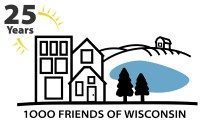1000 Friends of Wisconsin was mentioned in Next City’s weekly roundup of newsworthy transportation developments:
-see the full article
Has the “freeway revolt” made a comeback? It appears the answer is yes, though the battleground has shifted. Now, it’s freeway widening that has drawn opposition from urban advocacy groups, many of whom argue, as a January commentary in City Observatory did, that road widening invariably brings with it its own increased congestion. (Don’t forget, either, the Portland troubadour whose “ballad of induced demand” went viral in 2018.) Right now, groups in Pennsylvania, Wisconsin and Texas are doing their best to stop freeway widening projects.
In Milwaukee, the Milwaukee Independent reports that social-justice, public-interest and environmental advocates are moving to bury once again a freeway-widening project they thought had died. In his annual budget address, Gov. Tony Evers, a Democrat, said his budget would focus on “improving infrastructure, addressing climate change and increasing racial justice.” But according to a statement from one of the opponents, the interfaith social-justice advocacy group MICAH, two of those goals are in conflict with each other in Evers’ revival of a plan to widen east-west I-94 through Milwaukee.
“MICAH’s opposition to rebuilding I-94 between the Marquette and Zoo Interchange lanes is longstanding,” Rev. Joseph Jackson, president of MICAH, is quoted as saying in the article. “We joined other community groups in a federal lawsuit in 2017 to stop expansion. Monies were not included in [former Governor Scott Walker’s] budget and the project was dropped. With the inclusion of the expansion in the Governor’s current budget, we once again raise the issue of racial equity which this proposal fails to address.
“We call on WisDOT to develop an alternative that rebuilds the highway without adding lanes and provides benefits to lower income communities of color equal to the benefit that will be provided to affluent white communities who will take advantage of increased ease in access to Milwaukee jobs, entertainment, recreation and other valuable City resources. And we call for that same racial equity in terms of the many jobs that will be created and access to transit alternatives for those without cars.”
Joining MICAH in opposing the revived expansion plan are WISPIRG, a public-interest group, and two groups concerned about the project’s effects on the environment, 1000 Friends of Wisconsin and the Sierra Club — Wisconsin Chapter. All of the groups advocate a reconstruction plan that would not widen the highway’s footprint and include more transit options for the largely Black neighborhoods through which I-94 runs. (Dyer’s budget as presented includes an additional $3.5 million in transit operating assistance, but the widening project carries a $1 billion price tag.) The groups also call for the state to conduct a comprehensive environmental impact review of the options for rebuilding I-94.
Meanwhile, the Philadelphia-based political action committee 5th Square and other advocacy groups across Pennsylvania have put highway widening proposals statewide in their crosshairs, according to an article in the Pittsburgh CityPaper. The Pennsylvania Department of Transportation (PennDOT) has said it will need $15 billion a year to keep the state’s roads and bridges up to snuff, but current funding sources will provide only $6.9 billion. A fight is now brewing in Harrisburg over how to raise the rest of the money, but the advocates question whether all that $15 billion is really necessary. “Take those PennDOT estimates of their budget needs with a big bucket of salt,” 5th Square co-founder Jon Geeting said in a Tweet aimed at reporters covering transportation in Pennsylvania March 15. “There are all kinds of dubious highway and road capacity expansion projects included in those totals that are unnecessary and shouldn’t happen.” One of the most dubious of those projects: PennDOT’s plan to double the width of I-83 through Harrisburg, a $300 million project that the City of Harrisburg opposes and the advocacy group U.S. PIRG has called a “boondoggle.” PennDOT defends the project as necessary to upgrade a freeway that was poorly designed to begin with, but Harrisburg Mayor Eric Papenfuse said in 2019 that the widening would conflict with the city’s goals of reducing driving and traffic fatalities in the Pennsylvania capital.
And in Houston, the “advocacy group” fighting a freeway expansion project is Harris County itself. The Houston Chronicle reports that County Attorney Christian Menefee filed suit in U.S. District Court to force the Texas Department of Transportation (TxDOT) to halt all development work on its planned $7 billion rebuilding of I-45 through Houston and completely redo its environmental impact review. The county argues that in drawing up its plans, TxDOT completely ignored the county’s expressed desire that the rebuilt highway remain within its current footprint and that it include ways to improve transit and reconnect local streets.
“We cannot allow TxDOT to cut corners and fail to live up to their duty,” Menefee told the Chronicle. “Very early in the process they ruled out opportunities for no land expansion.”
And Harris County is not the only governmental body to place Jersey barriers in the path of the I-45 reconstruction plan. The Federal Highway Administration told TxDOT March 8 to “pause before initiating further contract solicitation” on the project while it investigates whether it followed Civil Rights-era rules on displacing minority families. The Chronicle reported last summer that the reconstruction project would affect more than 1,075 dwelling units, including hundreds of public housing units, and 340 businesses north of downtown in a largely Hispanic section of the city.
Read the full article here – https://nextcity.org/daily/entry/the-freeway-revolt-returns-this-time-over-widening.
